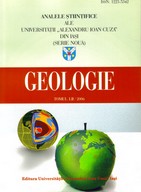
English title
- SERIA
GEOLOGIE (AUI-G) - |

|
| Log in New account |
| Home | Main Page | Guide for Authors | Peer Review | New Articles | Events | Archive | Index | Contact us |

|
Article Geochemical assessment of soil potentially toxic elements from Copou – Iaşi vineyard area (NE Romania)
Sîrbu-Rădășanu Doina Smaranda - “Al. I. Cuza” University of Iaşi, Faculty of Geography and Geology, Department of Geology, 20A Carol I Blv., 700505 Iaşi, Romania, Department of Geology Huzum Ramona - “Al. I. Cuza” University of Iaşi, Faculty of Geography and Geology, Department of Geology, 20A Carol I Blv., 700505 Iaşi, Romania, Department of Geology Iftode Simona Petronela - “Al. I. Cuza” University of Iaşi, Faculty of Geography and Geology, Department of Geology, 20A Carol I Blv., 700505 Iaşi, Romania, Department of Geology Iancu Gabriel-Ovidiu - “Al. I. Cuza” University of Iaşi, Faculty of Geography and Geology, Department of Geology, 20A Carol I Blv., 700505 Iaşi, Romania, Department of Geology Buzgar Nicolae - “Al. I. Cuza” University of Iaşi, Faculty of Geography and Geology, Department of Geology, 20A Carol I Blv., 700505 Iaşi, Romania, Department of Geology View abstract as pdf file | View full article as pdf file Abstract: The Copou-Iaşi area is one of the oldest from the well-known vineyard region of Moldavian
Platform (Eastern Romania). A number of 36 plots soil samples were systematically collected
from a 0–40 cm depth. Soil profiles nearby the plots were sampled for the geochemical
assessment of potentially toxic elements (PTE), using deep soil layers as controlled reference
samples. The collected samples were analyzed for a series of 18 elements using ED-XRF
method. The assessment of soil contamination was carried out by PCA multivariate statistic
method and some geochemical indices (EF, AC,CF, CD) were calculated in addition. The
obtained data shows an enrichment of PTE for the upper soil layer and denote an anthropogenic
source due to the specifically disturbance of vineyards soils. Comparing to the Romanian
legislation in force Cr, Ni, Pb and As exceed the normal values, but are within the alert
threshold. Only Cu content exceed the Romanian alert threshold. A special attention is required
in case of Cu and Cd due to their largest anthropogenic fraction, which increase the toxicity risk.
The interaction between organic matter and PTE as result from PCA suggest that the toxicity
risk is controlled by the stability of physico-chemical properties of vineyard soil. Keywords: vineyard soil, Copou-Iaşi, PTE, PCA, contamination, geochemical index, ED-XRF |
copyright © 2024 Department of Geology |